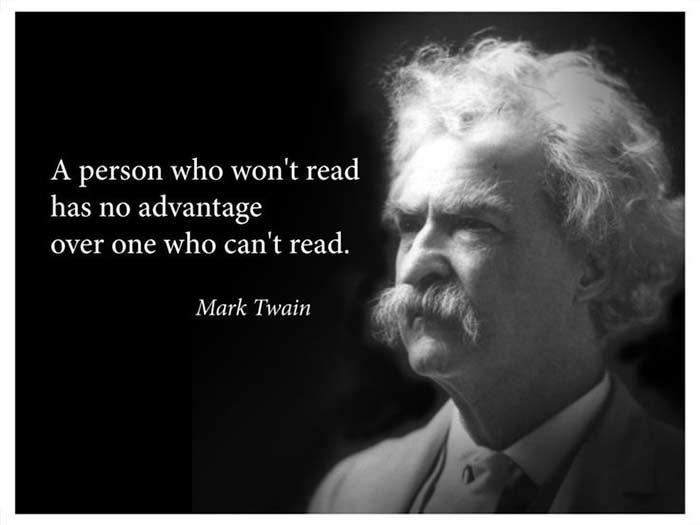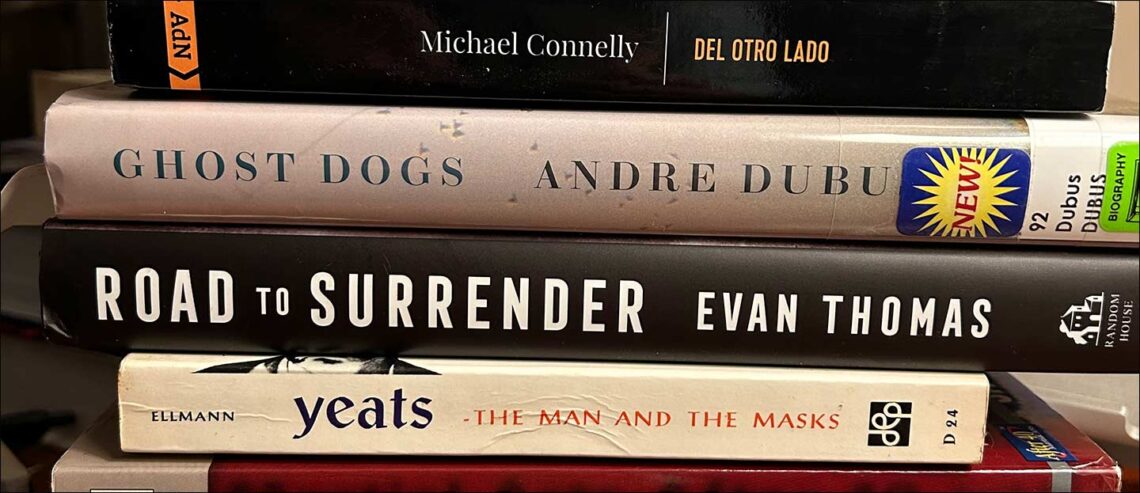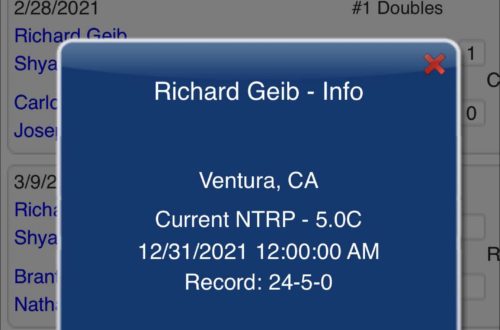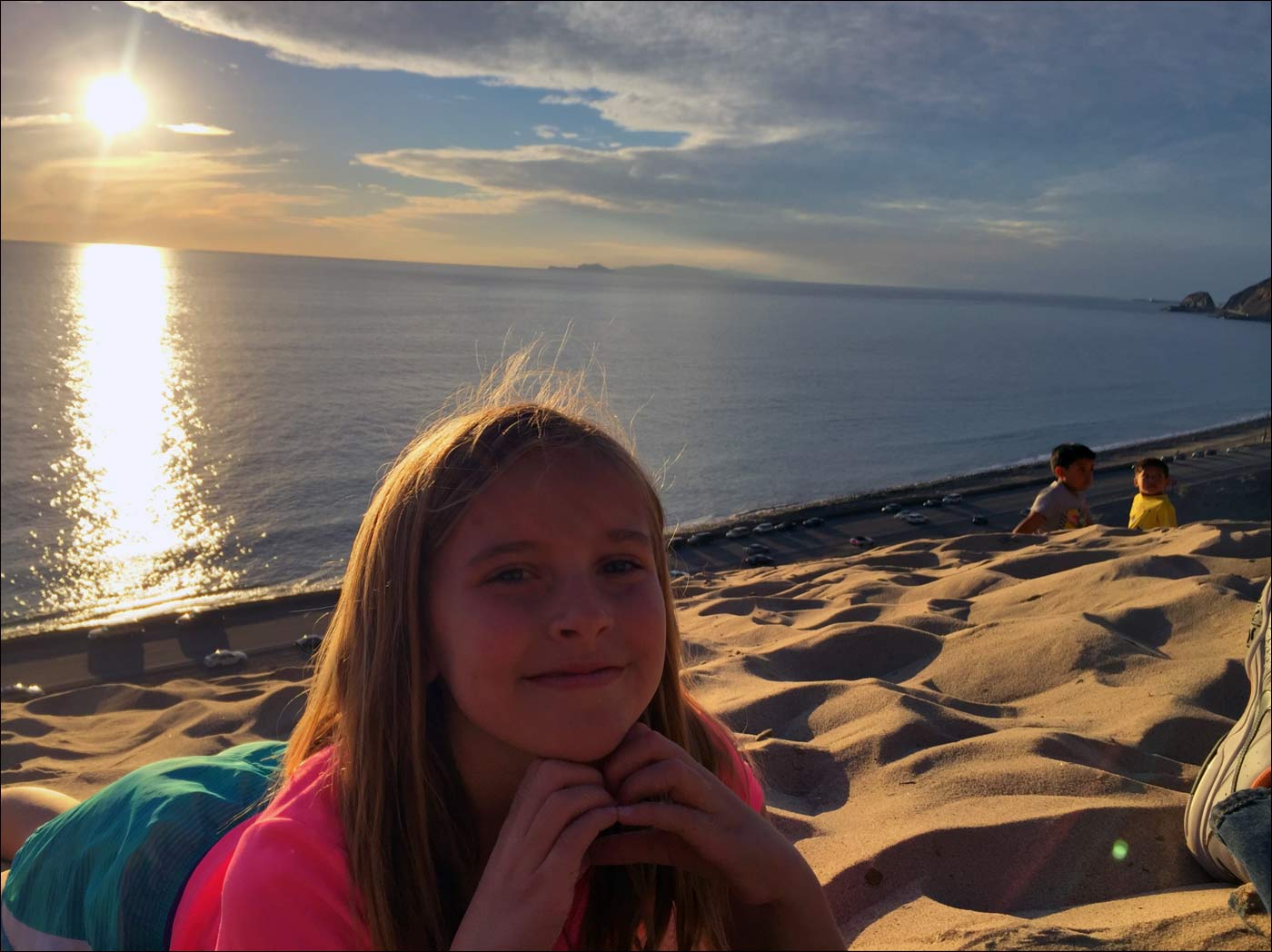I have been coaching high school tennis for four years now.
I do this because my daughter was on the team, and I wanted her team experience to go well. So I became the coach. “If you want a job done well, then do it yourself,” I thought to myself. After all the isolation of my daughter’s Covid-19 pandemic experience, I wanted her to have a solid team experience with quality friends and abundant exercise.
That has worked out well. In fact, it worked out very well. But there has been a cost.
I have always thought that high school sports were sort of an artificial tax on the academics offered on campus. To be more clear: teachers who are coaches are often not very good teachers. Let me explain. It is going to be very difficult to be an effective teacher and grade papers at night and be ready to teach the next day if you are coaching all afternoon. This should be self-evident. If you were coaching a high school baseball game until 8 pm the night before, you are going to be exhausted the next morning. To be a teacher and plan for all your classes and grade student work for 160 kids is a tall task as it is. To do all that in your classroom during the day and then be a coach for another four hours is too much. Your coaching will cut into the quality of your teaching. It is almost unavoidable. Ideally all coaches should be non-academic staff. In reality, the job of “coach” is often performed by teachers. If the athletes in the afternoon benefit from this teacher-coach’s actions, his students during the day will suffer to one extent or another. One would think this would be self-evident. I have had several persons complain to me their history department in high school was full of football coaches, and the teaching as a result was sub-par. I don’t doubt it.
There is a distinguished basketball coach at a nearby high school who has decades of success with her teams. I have serious questions about what exactly her classroom performance looked like when she was investing her best hours and energies on the basketball hardcourt. Her primary job title for which she is paid is “teacher,” after all. Not coach. Teachers get a small stipend for coaching but almost all their salary is for their classroom teaching. But how many give short shrift to their teaching because of their coaching? If a coach leaves most of their energy and passion with their team team in the evenings, how much does he have left as a teacher the next morning? You cannot be all things to all people. Again, it is too much.
I remember twenty years ago my magnetic public high school was asked to hire two baseball coaches from a neighboring regular high school as teachers. They wanted us to hire them to teach math on our campus, even though they were really being hired to be baseball coaches at another school. We didn’t hire them because they weren’t experienced and capable at teaching math, and the other high school grew angry. We wanted quality math teachers. Coaching was a very much secondary concern for us. This is a school. It is not a minor league baseball system. Especially at the college level, how much of a corrupting influence are NCAA sports on the whole academic institution? Places where the basketball or football coaches makes three times more than the university president?
At any rate, I have been overextended for some time coaching high school tennis and teaching six classes of some 170 students. My coaching tenure will be coming to an end soon, thankfully. Nevertheless, I am struggling at the moment with aspect of my life: reading. As usual, I see or hear about books here and there and I make a note get a hold of that book. But those books are beginning to pile up next to my bed. I have been unable to find the time to read them. I am too busy; I don’t have enough time. It is like trying to spread too little butter over too much bread. I am making a decision right now to do better on this. The books on my list to read are growing many. It is a bit out of control. I am coming to resemble one of those people at a restaurant who looks at the menu with enthusiasm and orders way more food in one sitting that I can reasonably digest.
Even with being so over-busy recently, I read approximately four books per month. Beyond my job, my family, my workouts, my coaching, this is supremely important to me. It is where I learn more about the world and myself. A man who reads books has advantages over others, in ways large and small. Reading is what makes me a better teacher, father, husband, and citizen. I have lived this way my entire life. Reading and writing (ie. thinking) is how I make sense of the world. It could not be important. And I am semi-falling down on that job.
True, I still read. I read the entire “Troubled” memoir by Robert Henderson last week. It was my spring break week off from work, and I bore down and devoured the book. What an enriching read! And there have been others, too. But there are several quality books which remain untouched next to my bed. I buy and want to read them but they seem to fall through the cracks. And the stack is getting taller lately. Among the pending titles are the following: “Filterworld” by Kyle Chayka, “Bad Therapy” by Abigail Shrier, “Familiarity Breeds Content” by Joseph Epstein, “The Resurrection Walk” by Michael Connelly, among others. I very much want to read all these books. But they will require no small expenditure of time and energy. I have neither at this moment, unfortunately.
What can I do?
I can be more intentional.
I can make a few conscious decisions.
First, put your damn iPhone away, Richard. You get little value checking the New York Times yet again, or the Reddit forum on retirement, or ATP daily tennis highlight reels on YouTube. Actions like those are akin to eating candy: a rare indulgence maybe, but too much will rot your brain. All those little moments add up and result in the opportunity cost of less time to read books.
So here we go: I will put my phone away from myself later in the evening. Park it someplace away from arm’s reach as a policy at night. This should allow me more quality unfocused time before bed to invest the hours it takes to make my way through complicated and dense texts. This can enrich my life enormously; I can better understand my own world and the one around me: that is the stuff which matters. Various Internet pop culture alluvia or bitter culture war bromides bandied about on social media are unimportant, at best. Worthless, more often. A poor use of my precious time.
Come on, Richard. Control where you direct your attention. Read the books you want to read. It all adds up. Don’t waste your time.
Four good books per month. That means one book per week, more or less. That has been my literary diet for decades. I have never understood how others read ten or twelve serious books per month, although I know some people do. Even if I were retired I’m not sure I could read more than four books per month. It takes me time to read and digest complex text. It is important to reflect and digest what you read, in addition to just reading the words off the page; serious reading requires solid reflection and digestion, and that requires uninterrupted time and effort, and I believe it cannot be rushed (at least without lessening the learning). So four books per month. Every month, Richard.
But not less than four books.
Make the time. Don’t squander it. That is what your life is made out of: time. Get through that stack of books which is growing larger by the month. Here it is –
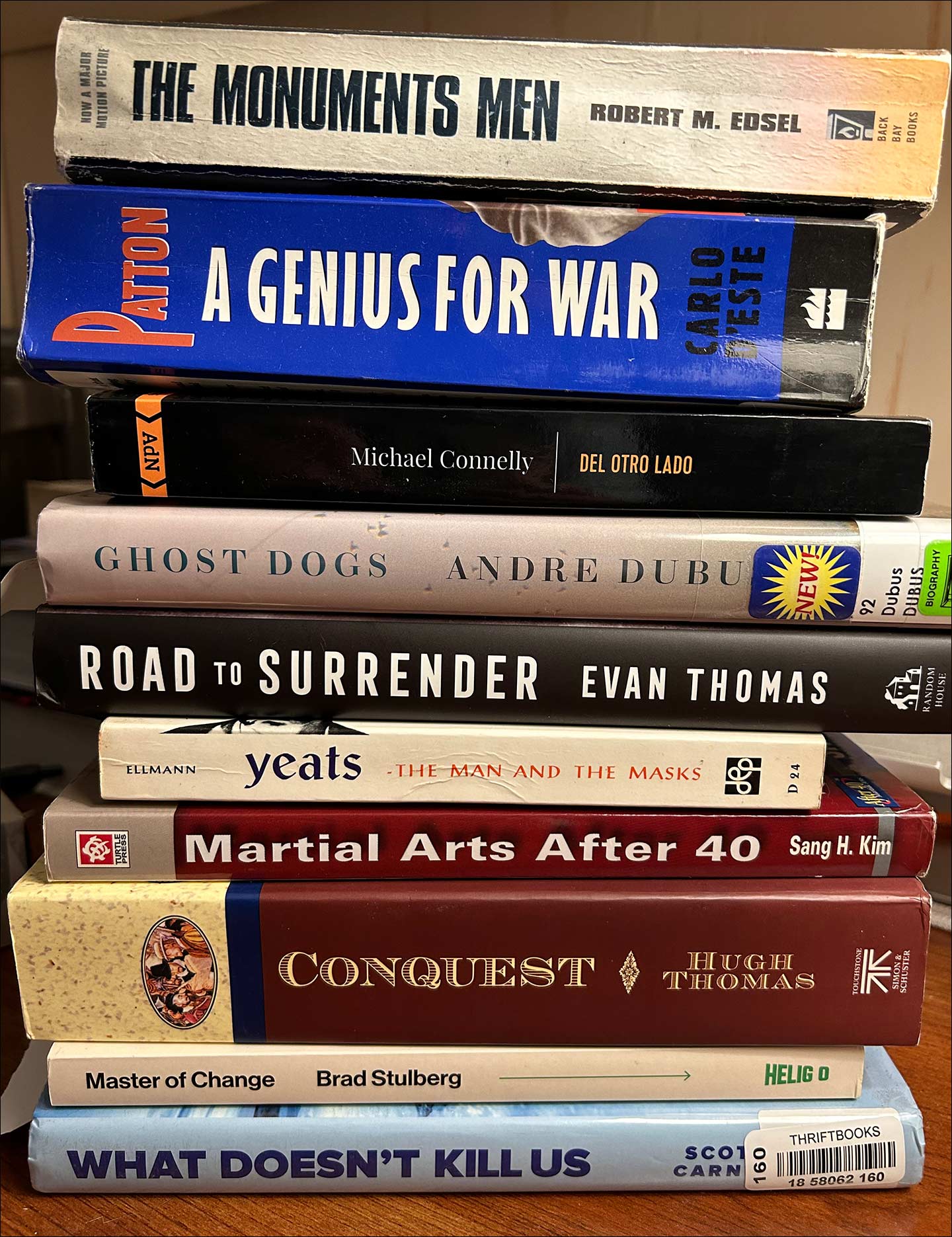
– and those books are waiting.
Use your time well, Richard. Read those books. An hour or two daily. Without fail.
Make a few changes.
Today.
You might not have to read them all tomorrow. But time is on your side. During the summer you will have the time. The boys high school tennis team season ends in a few weeks. That will also free up time. Don’t let these books fall through the cracks. READ THEM. The prospect of those books getting filed away and lost leaves me with a panicky feeling of loss. But if I am careful, they will not escape.
It is not only those books on your “to do” list, Richard. Assimilate your Spanish notes from the early 1990s into your current ones. Especially the Spanish poetry. That will take time. Make the time and do it. And read and study all the Spanish in Narcos Mexico Season II episodes. You have the .sri subtitle files downloaded. Now convert them to text files and read them closely, learning all the new vocabulary/slang you didn’t already know. Then enjoy watching all ten of those episodes, just as you did season one.
And get out on your bike under the California sun and workout your heart and lungs. BE HEALTHY. Sweat and exercise. Swim laps in the pool. Hit tennis balls with your buddies. Be comfortable in your own body. Try to learn something new everyday. All this coaching-teaching-parenting over-busyness is a subtle form of violence to the self, in my opinion. Resist it, as much as possible.
Do those things instead which are lifegiving and help you to grow your soul. Try to minimize the tedious adult responsibilities which take up so much of your time.
Differentiate between what is important and what is not. Embrace the former, ignore the latter. When you retire, Richard, you can do only what you want. It is coming. Soon.
Meanwhile, I have these books to read. And my Spanish notes over several decades need to be re-ordered: that will take some 15-20 hours. And Narcos Mexico (another 20 or so hours). Have all this done by August 15, 2024. Do it. You are putting this down in public.
Which is why I have written down these mini goals here. Hopefully in four months I can look back and have all these books done and dusted, as well as my Spanish consolidated and improved.
Four months, Richard. No excuses.
Amen.
